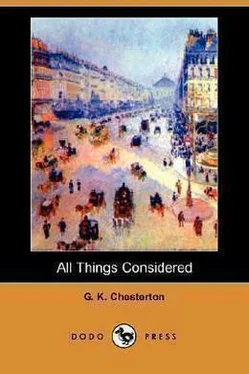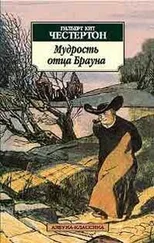It is perfectly obvious that in any decent occupation (such as bricklaying or writing books) there are only two ways (in any special sense) of succeeding. One is by doing very good work, the other is by cheating. Both are much too simple to require any literary explanation. If you are in for the high jump, either jump higher than any one else, or manage somehow to pretend that you have done so. If you want to succeed at whist, either be a good whist–player, or play with marked cards. You may want a book about jumping; you may want a book about whist; you may want a book about cheating at whist. But you cannot want a book about Success. Especially you cannot want a book about Success such as those which you can now find scattered by the hundred about the book–market. You may want to jump or to play cards; but you do not want to read wandering statements to the effect that jumping is jumping, or that games are won by winners. If these writers, for instance, said anything about success in jumping it would be something like this: "The jumper must have a clear aim before him. He must desire definitely to jump higher than the other men who are in for the same competition. He must let no feeble feelings of mercy (sneaked from the sickening Little Englanders and Pro–Boers) prevent him from trying to do his best . He must remember that a competition in jumping is distinctly competitive, and that, as Darwin has gloriously demonstrated, THE WEAKEST GO TO THE WALL." That is the kind of thing the book would say, and very useful it would be, no doubt, if read out in a low and tense voice to a young man just about to take the high jump. Or suppose that in the course of his intellectual rambles the philosopher of Success dropped upon our other case, that of playing cards, his bracing advice would run—"In playing cards it is very necessary to avoid the mistake (commonly made by maudlin humanitarians and Free Traders) of permitting your opponent to win the game. You must have grit and snap and go in to win . The days of idealism and superstition are over. We live in a time of science and hard common sense, and it has now been definitely proved that in any game where two are playing IF ONE DOES NOT WIN THE OTHER WILL." It is all very stirring, of course; but I confess that if I were playing cards I would rather have some decent little book which told me the rules of the game. Beyond the rules of the game it is all a question either of talent or dishonesty; and I will undertake to provide either one or the other—which, it is not for me to say.
Turning over a popular magazine, I find a queer and amusing example. There is an article called "The Instinct that Makes People Rich." It is decorated in front with a formidable portrait of Lord Rothschild. There are many definite methods, honest and dishonest, which make people rich; the only "instinct" I know of which does it is that instinct which theological Christianity crudely describes as "the sin of avarice." That, however, is beside the present point. I wish to quote the following exquisite paragraphs as a piece of typical advice as to how to succeed. It is so practical; it leaves so little doubt about what should be our next step—"The name of Vanderbilt is synonymous with wealth gained by modern enterprise. 'Cornelius,' the founder of the family, was the first of the great American magnates of commerce. He started as the son of a poor farmer; he ended as a millionaire twenty times over."
"He had the money–making instinct. He seized his opportunities, the opportunities that were given by the application of the steam–engine to ocean traffic, and by the birth of railway locomotion in the wealthy but undeveloped United States of America, and consequently he amassed an immense fortune.
"Now it is, of course, obvious that we cannot all follow exactly in the footsteps of this great railway monarch. The precise opportunities that fell to him do not occur to us. Circumstances have changed. But, although this is so, still, in our own sphere and in our own circumstances, we can follow his general methods; we can seize those opportunities that are given us, and give ourselves a very fair chance of attaining riches."
In such strange utterances we see quite clearly what is really at the bottom of all these articles and books. It is not mere business; it is not even mere cynicism. It is mysticism; the horrible mysticism of money. The writer of that passage did not really have the remotest notion of how Vanderbilt made his money, or of how anybody else is to make his. He does, indeed, conclude his remarks by advocating some scheme; but it has nothing in the world to do with Vanderbilt. He merely wished to prostrate himself before the mystery of a millionaire. For when we really worship anything, we love not only its clearness but its obscurity. We exult in its very invisibility. Thus, for instance, when a man is in love with a woman he takes special pleasure in the fact that a woman is unreasonable. Thus, again, the very pious poet, celebrating his Creator, takes pleasure in saying that God moves in a mysterious way. Now, the writer of the paragraph which I have quoted does not seem to have had anything to do with a god, and I should not think (judging by his extreme unpracticality) that he had ever been really in love with a woman. But the thing he does worship—Vanderbilt—he treats in exactly this mystical manner. He really revels in the fact his deity Vanderbilt is keeping a secret from him. And it fills his soul with a sort of transport of cunning, an ecstasy of priestcraft, that he should pretend to be telling to the multitude that terrible secret which he does not know.
Speaking about the instinct that makes people rich, the same writer remarks―
"In olden days its existence was fully understood. The Greeks enshrined it in the story of Midas, of the 'Golden Touch.' Here was a man who turned everything he laid his hands upon into gold. His life was a progress amidst riches. Out of everything that came in his way he created the precious metal. 'A foolish legend,' said the wiseacres of the Victorian age. 'A truth,' say we of to–day. We all know of such men. We are ever meeting or reading about such persons who turn everything they touch into gold. Success dogs their very footsteps. Their life's pathway leads unerringly upwards. They cannot fail."
Unfortunately, however, Midas could fail; he did. His path did not lead unerringly upward. He starved because whenever he touched a biscuit or a ham sandwich it turned to gold. That was the whole point of the story, though the writer has to suppress it delicately, writing so near to a portrait of Lord Rothschild. The old fables of mankind are, indeed, unfathomably wise; but we must not have them expurgated in the interests of Mr. Vanderbilt. We must not have King Midas represented as an example of success; he was a failure of an unusually painful kind. Also, he had the ears of an ass. Also (like most other prominent and wealthy persons) he endeavoured to conceal the fact. It was his barber (if I remember right) who had to be treated on a confidential footing with regard to this peculiarity; and his barber, instead of behaving like a go–ahead person of the Succeed–at–all–costs school and trying to blackmail King Midas, went away and whispered this splendid piece of society scandal to the reeds, who enjoyed it enormously. It is said that they also whispered it as the winds swayed them to and fro. I look reverently at the portrait of Lord Rothschild; I read reverently about the exploits of Mr. Vanderbilt. I know that I cannot turn everything I touch to gold; but then I also know that I have never tried, having a preference for other substances, such as grass, and good wine. I know that these people have certainly succeeded in something; that they have certainly overcome somebody; I know that they are kings in a sense that no men were ever kings before; that they create markets and bestride continents. Yet it always seems to me that there is some small domestic fact that they are hiding, and I have sometimes thought I heard upon the wind the laughter and whisper of the reeds.
Читать дальше








